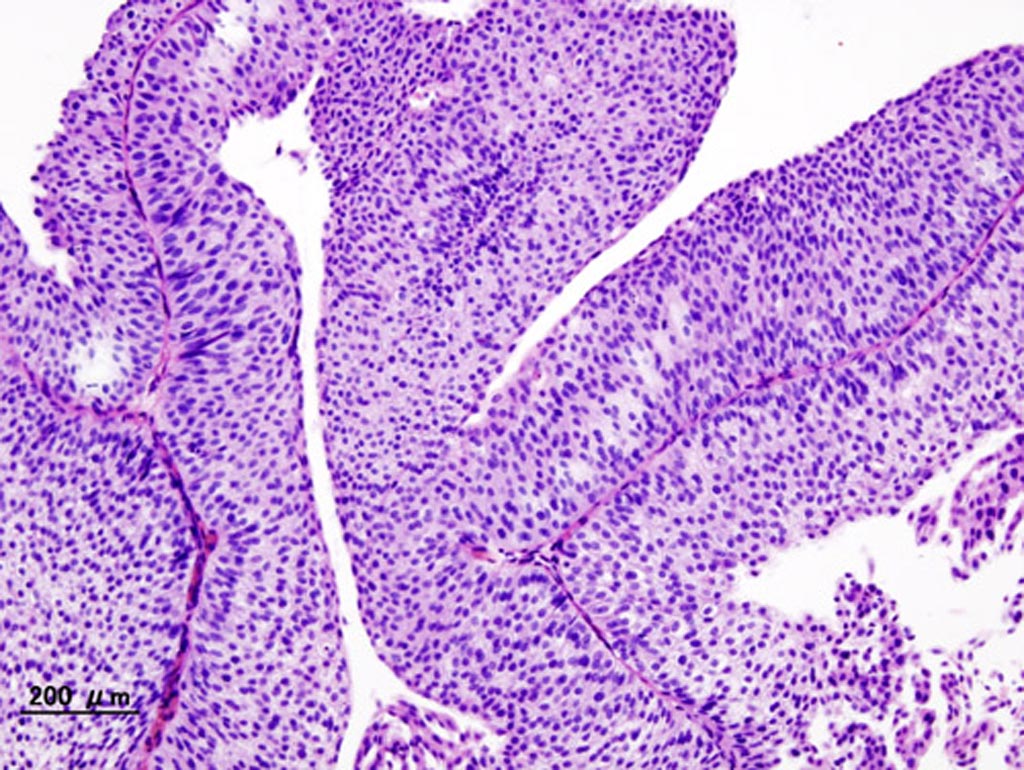MicroRNA Biomarker Identified for Bladder Cancers
By LabMedica International staff writers
Posted on 18 Jul 2018
Cancer researchers have identified a microRNA that acts as a prognostic biomarker of p53-like bladder cancers.Posted on 18 Jul 2018
MicroRNAs (miRNAs) and short interfering RNAs (siRNA) comprise a class of about 20 nucleotides-long RNA fragments that block gene expression by attaching to molecules of messenger RNA in a fashion that prevents them from transmitting the protein synthesizing instructions they had received from the DNA. MiRNAs resemble siRNAs of the RNA interference (RNAi) pathway, except miRNAs derive from regions of RNA transcripts that fold back on themselves to form short hairpins, whereas siRNAs derive from longer regions of double-stranded RNA. With their capacity to fine-tune protein expression via sequence-specific interactions, miRNAs help regulate cell maintenance and differentiation.

Image: A histopathology of urothelial carcinoma of the urinary bladder (Photo courtesy of Wikimedia Commons).
Bladder cancers can be categorized into subtypes according to gene expression patterns. P53-like muscle-invasive bladder cancers are generally resistant to cisplatin-based chemotherapy, but exhibit heterogeneous clinical outcomes with a prognosis intermediate to that of the luminal and basal subtypes. The optimal approach to p53-like tumors remains poorly defined and better means to risk-stratify such tumors and identification of novel therapeutic targets is urgently needed. MicroRNAs play a key role in cancer, both in tumorigenesis and tumor progression. In the past few years, miRNA expression signatures have been reported as prognostic biomarkers in different tumor types including bladder cancer. However, miRNA’s expression does not always correlate well with its activity.
Investigators at Mount Sinai School of Medicine (New York, NY, USA) had previously developed ActMiR, a computational method for explicitly inferring miRNA activities. For the current study, they applied ActMiR to The Cancer Genome Atlas (TCGA) bladder cancer data set and identified the activities of the microRNAs miR-106b-5p and miR-532-3p as potential prognostic markers of the p53-like subtype, and validated them in three independent bladder cancer data sets.
The investigators reported in the July 3, 2018, online edition of the journal Oncogene that higher miR-106b-5p activity was consistently associated with better survival. Furthermore, they experimentally validated causal relationships between miR-106-5p and its predicted target genes in p53-like cell line HT1197. HT1197 cells treated with the miR-106b-5p-specific inhibitor were more invasive while cells treated with the miR-106b-5p-specific mimic were less invasive than corresponding controls.
Altogether, these results suggested that miR-106b-5p activity could categorize p53-like bladder tumors into more and less-favorable prognostic groups, which provided critical information for personalizing treatment option for p53-like bladder cancers.
“P53-like bladder cancers are generally resistant to standard chemotherapy treatment, and prognoses for these patients are so varied,” said senior author Dr. Jun Zhu, professor of genetics and genomic sciences at Mount Sinai Medical School. “Our computational methods not only provided us with deeper insights into the cellular mechanisms underlying this elusive type of bladder cancer, but also reveal the potential of microRNAs as therapeutic targets in treating it."
Related Links:
Mount Sinai School of Medicine













